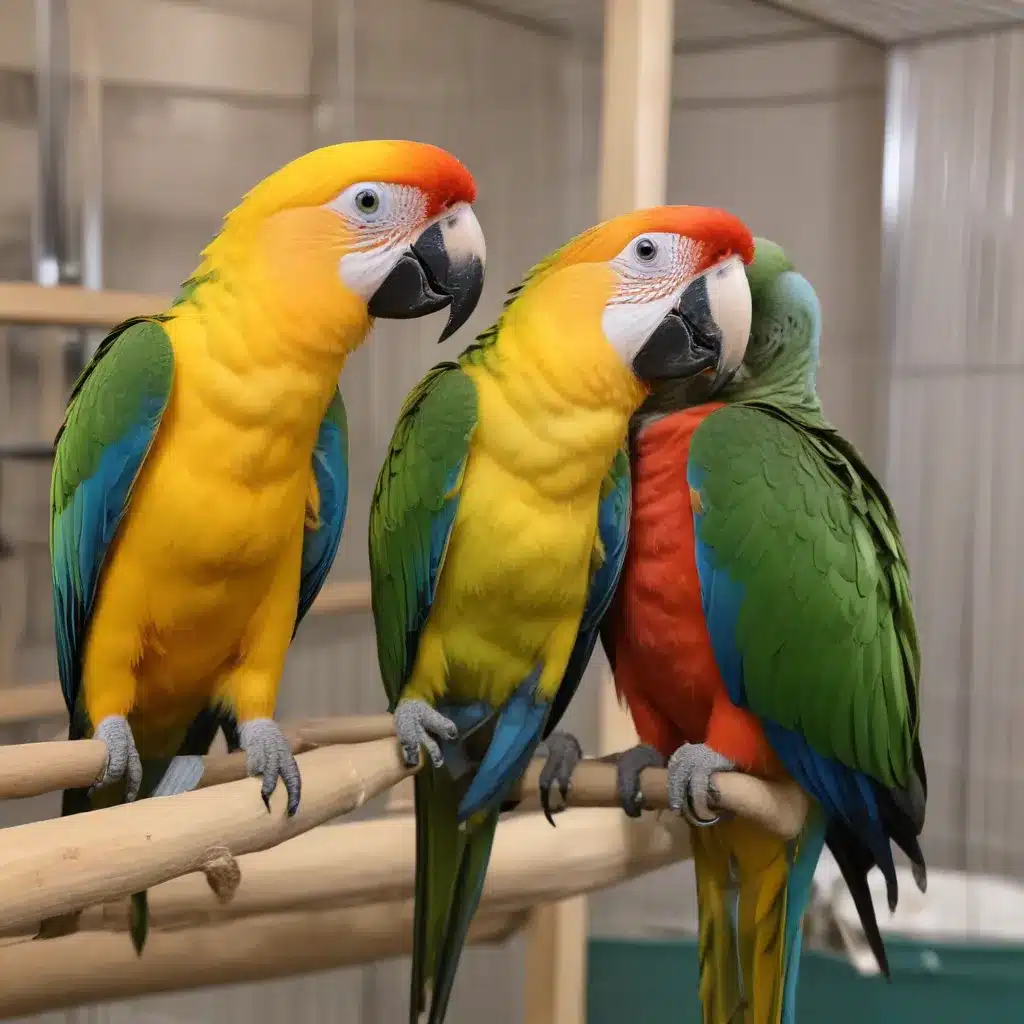
Behavior Modification Techniques
As an experienced avian caretaker and expert in bird species, I’ve seen the incredible potential of operant conditioning to teach complex behaviors in parrots. This powerful technique allows us to shape and refine behaviors in a positive, reward-based manner – unlocking the cognitive abilities of these intelligent creatures.
Positive Reinforcement
At the core of operant conditioning is positive reinforcement – rewarding desirable behaviors to increase their frequency. With parrots, this often involves using their favorite treats, like seeds or nuts, to reinforce actions we want to see more of. The key is to time the reward precisely, delivering it the instant the bird performs the target behavior. This clear link between action and consequence is what allows parrots to quickly understand and repeat the desired conduct.
Negative Reinforcement
While positive reinforcement is the foundation, negative reinforcement can also have a role to play. This involves removing an unpleasant stimulus (such as a restraint or annoying sound) when the parrot exhibits the correct behavior. Used judiciously, negative reinforcement can help parrots learn to avoid unwanted actions and willingly cooperate. However, the focus should always remain on rewarding good behaviors, not punishing bad ones.
Shaping
One of the most powerful applications of operant conditioning is the technique of shaping. This involves gradually molding a complex behavior by rewarding smaller, incremental steps along the way. For example, when teaching a parrot to “step up” onto a hand, we might start by rewarding any movement towards the hand, then only reward when a foot is lifted, then only when the foot is placed on the hand. By slowly raising the criteria, the bird is guided towards mastering the full behavior.
Avian Cognition and Intelligence
Understanding the cognitive capabilities of parrots is crucial for effective operant conditioning. These remarkable birds possess advanced problem-solving skills, long-term memory, and the ability to learn intricate behaviors.
Parrot Behavior and Psychology
Parrots are highly social, curious, and intelligent creatures. They form strong emotional bonds, demonstrate self-awareness, and exhibit a range of complex behaviors, from mimicry to tool use. This rich psychological landscape means parrots are not simply responding to stimuli, but actively engaging in the training process and drawing on their cognitive faculties.
Cognitive Capabilities of Parrots
Scientific research has revealed that parrots possess impressive intellectual abilities. Many species can solve multi-step problems, understand abstract concepts, and even use basic language. This cognitive sophistication allows parrots to learn and perform complex behaviors far beyond simple tricks or commands.
Complex Behaviors in Parrots
From flying through hoops to “talking” on cue, parrots can be trained to exhibit a wide array of complex behaviors. These go far beyond basic obedience, tapping into the birds’ natural inclinations and problem-solving skills. With patience and the right techniques, we can harness their intelligence to teach behaviors that enhance their welfare, provide enrichment, and delight their human caretakers.
Applications of Operant Conditioning
Operant conditioning offers a versatile toolkit for shaping and refining complex behaviors in parrots. By leveraging positive reinforcement and the birds’ innate cognitive abilities, we can accomplish remarkable feats of training.
Training Complex Behaviors
Whether teaching a parrot to step onto a scale for weight monitoring, fly through hoops, or even “speak” on command, operant conditioning provides a systematic approach. By breaking down the desired behavior into smaller, achievable steps and rewarding each increment, parrots can be guided towards mastering even the most intricate actions.
Enrichment and Welfare
Beyond just entertainment, operant conditioning can also play a crucial role in avian enrichment and welfare. By training parrots to participate in their own care – such as stepping onto a scale or allowing nail trims – we can reduce stress and create a more positive, cooperative relationship. Additionally, complex training exercises provide vital mental stimulation and help prevent boredom or behavioral issues.
Practical Considerations
When implementing operant conditioning with parrots, there are several practical factors to consider. Timing the delivery of rewards with precision is essential, as is maintaining a high rate of reinforcement to keep the birds engaged. It’s also crucial to set clear, achievable criteria and gradually raise the bar as the parrot progresses. With patience, consistency, and a deep understanding of avian behavior, operant conditioning can be a transformative tool in parrot care.
Ethical Considerations in Avian Training
While the benefits of operant conditioning are clear, it’s important to approach this powerful technique with care and consideration for the birds’ welfare.
Animal Welfare Concerns
Responsible avian caretakers must always prioritize the well-being of their feathered charges. This means ensuring that training sessions are positive experiences, avoiding any undue stress or discomfort, and never using punishment or aversive stimuli. The ultimate goal should be to enhance the parrot’s quality of life, not just perform impressive tricks.
Responsible Training Practices
When applying operant conditioning with parrots, it’s crucial to follow best practices that uphold the highest standards of animal welfare. This includes maintaining calm, low-stress training environments, setting reasonable criteria, and always using food rewards (rather than deprivation) as the primary reinforcement. Patience, consistency, and a deep understanding of parrot behavior are also essential.
Regulatory Guidelines
In many regions, the training of exotic animals like parrots is subject to regulatory oversight and guidelines. Avian caretakers must familiarize themselves with the relevant laws and codes of practice in their area, ensuring their training methods align with ethical standards and legal requirements. Staying up-to-date on the latest research and guidelines is also crucial for responsible parrot care.
By embracing the power of operant conditioning while prioritizing the birds’ welfare, we can unlock the incredible potential of parrots and forge enriching, mutually beneficial relationships. With patience, expertise, and an unwavering commitment to ethical practices, the wonders of avian training can be realized to the fullest.


